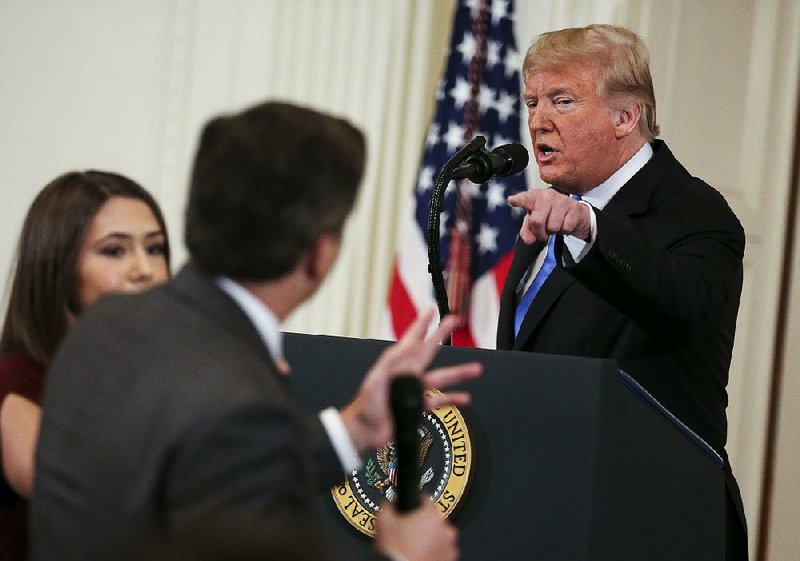CNN sued President Donald Trump's administration on behalf of reporter Jim Acosta on Tuesday, asking a court to restore Acosta's White House press pass after Trump suspended it last week.
The lawsuit seeks a judge's intervention after Trump banished Acosta from the White House grounds for an indefinite period after a news conference last week.
During the news conference, Acosta refused to give up a microphone when the president said he didn't want to hear anything more from him.
White House press secretary Sarah Huckabee Sanders initially explained the decision to revoke Acosta's pass by accusing him of making improper physical contact with the intern who was trying to grab the microphone. But that rationale disappeared after witnesses backed Acosta's account that he was just trying to keep the mic, and after Sanders distributed a doctored video that made it appear Acosta was more aggressive than he actually was.
CNN filed suit in U.S. District Court in Washington, D.C. "We have asked this court for an immediate restraining order requiring the pass be returned to Jim, and will seek permanent relief as part of this process," the news outlet said in a statement released Tuesday morning.
Legal experts said CNN's chances of winning in court are favorable because the First Amendment protects journalists against arbitrary restrictions by government officials.
"I think it's a really strong lawsuit," Floyd Abrams, a noted First Amendment lawyer, told CNN on Sunday, before the suit was filed. "I think [CNN] should sue, and if it's not about Acosta, this is going to happen again. ... So whether it's CNN suing or the next company suing, someone's going to have to bring a lawsuit, and whoever does is going to win" unless the White House can show that Acosta is violent and disruptive.
The suit names CNN and Acosta as plaintiffs. Trump, Chief of Staff John Kelly, Deputy Chief of Staff for Communications Bill Shine, Sanders and the U.S. Secret Service are named as defendants. It alleges a violation of the First Amendment; a violation of the Fifth Amendment, which guarantees due process in government actions; and a violation of the Administrative Procedure Act. It asks for the immediate restoration of Acosta's credential, or restoration pending a hearing before a "neutral" arbiter.
In a statement, Sanders called the suit "more grandstanding from CNN" and said the White House will "vigorously" defend itself.
She made no mention of a physical altercation between Acosta and the press aide and instead said the suspension was because Acosta would not yield to other reporters.
"After Mr. Acosta asked the president two questions -- each of which the president answered -- he physically refused to surrender a White House microphone to an intern, so that other reporters might ask their questions," Sanders said. "This was not the first time this reporter has inappropriately refused to yield to other reporters. ... The First Amendment is not served when a single reporter, of more than 150 present, attempts to monopolize the floor."
Last year, a federal judge struck down Trump's blocking of critics on Twitter. She ruled that the First Amendment prevented him from denying access to presidential statements because of a would-be follower's opinions and views.
The same principle applies in the Acosta case, said Jameel Jaffer, executive director of the Knight First Amendment Institute at Columbia University, which brought the Twitter suit last year.
"The government cannot exclude reporters from [the White House] because of their views," Jaffer said. "Once the government created a general right of access, it cannot selectively withdraw it based on viewpoint. Viewpoint is not a criterion that establishes a media organization's right to be at a news briefing."
CNN's lawsuit, he added, "is critical to preserve the media's ability to ask hard questions and hold the government accountable. ... It would be intolerable to let this kind of thing go unchallenged. Other reporters would end up hesitating before asking sharp questions, the White House would be able to use the threat of similar revocations for critical coverage, and media coverage of the White House would be distorted because of fear of official retaliation."
Other journalists have been widely supportive of Acosta since Trump pushed him out last week. In a statement Tuesday, the White House Correspondents Association's president, Olivier Knox, said the organization "strongly supports" CNN in regaining the reporter's access. He said the revocation of Acosta's credential was a "disproportionate reaction" to the news conference incident.
"The president of the United States should not be in the business of arbitrarily picking the men and women who cover him," Knox said.
Information for this article was contributed by Deanna Paul of The Washington Post and by David Bauder of The Associated Press.
A Section on 11/14/2018
